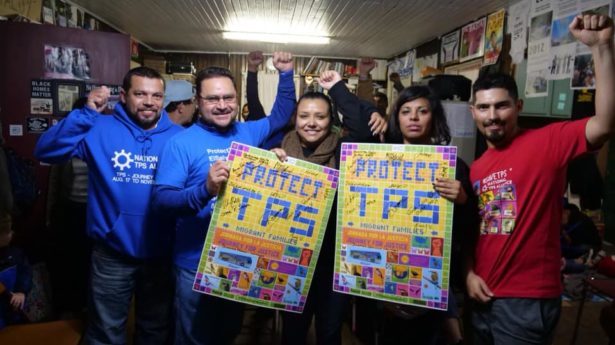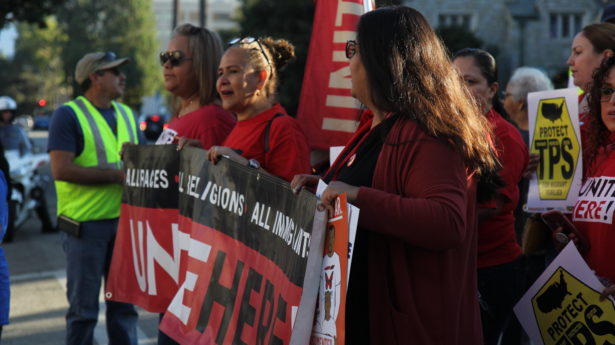The Unitarian Universalist Service Committee advances human rights through grassroots collaborations.
Assassination of Haiti’s President Underscores Importance of Supporting Haitian People Living In and Migrating to the U.S.

By Mike Givens on July 15, 2021
Update: As of August 3, 2021, the Federal Register Notice for the Haiti Temporary Protected Status (TPS) designation has been published. Haitian nationals who may qualify for TPS can find information on how to apply at this link.
The assassination of former Haitian President Jovenel Moïse on July 7 has created additional political instability within and uncertainty for the Caribbean country. As the world watches the fallout from Moïse’s death, the United States can make a compassionate contribution—and recognize its historic responsibility for the problems plaguing Haiti—by ensuring that its own policies and practices treat Haitian people that either live in the country or are migrating to it with the dignity and respect they deserve.
Crucially, this requires halting all deportations and expulsions of Haitian people, and respecting the internationally-protected right of Haitian refugees to seek safety on U.S. shores. Secretary of Homeland Security Alejandro Mayorkas’ comments on July 13, asserting that “Any migrant intercepted at sea, regardless of their nationality, will not be permitted to enter the United States,” are deeply concerning and constitute a threat to ignore or override fundamental U.S. obligations under international law.
The U.S. government must chart a more humane course. Below are three key ways the United States can support Haitian people—and all people exercising their right to migrate—within its borders:
Publish the Federal Register Notice: On Saturday, May 22, Secretary Mayorkas extended temporary protected status (TPS) designations for Haitian nationals living in the United States. However, the designation cannot go into effect for Haitian nationals until a federal register notice is published making Mayorkas’ decision official. The notice will outline the application process, guidelines for employment authorization, and officially commence the beginning of the 18-month relief period for status protections.
The United States has a history of extending these protections to Haitian people living in the country dating back to the 2010 earthquake. According to the order, any Haitian national living in the United States may apply for a TPS designation as long as they were living in the country as of May 21.
While a promising first step, it’s been nearly two months and the federal register notice has not been published. A July 13 fact sheet from the White House indicates that it may be coming in the next few days. We hope this is the case, and we urge Sec. Mayorkas to follow through on this promise as quickly as possible.
The July 7 assassination is just another crisis that warrants the U.S. government’s immediate publishing of the federal register notice.
Allow for Humanitarian Parole: Since the devastating earthquake in 2010, Haiti has experienced an extended period of political and social turmoil. The United States has occasionally done the right thing and extended TPS protections to Haitian people migrating to the United States. Extending humanitarian parole—or providing legal protections for people immigrating to the United States who typically would not be eligible—is a commonsense solution to better support Haitian people looking for refuge.
Established for people coming into the United States who are experiencing a “compelling emergency,” humanitarian parole is used when “there is an urgent humanitarian reason or significant public benefit to allowing [them] to temporarily enter the United States.”
Given the uncertainty caused by last week’s assassination, the Biden administration should enact a humanitarian parole program for Haitian people forthwith.
While the United States made the right call in extending TPS to Haitian nationals in the wake of the 2010 earthquake that shook Haiti, our government has also been complicit in causing or worsening many of the country’s problems. This long history includes the brutal U.S. military occupation of Haiti in the first half of the 20th century, as well as U.S. support for a long line of corrupt and violent authoritarian leaders. A small step to mitigating its problematic relationship with the nation is providing an equitable process for Haitian nationals to enter and remain in the United States.
End Title 42: Former President Trump first began exploiting the Title 42 provision of the Public Health Safety Act in March of 2020 as part of a racist and xenophobic campaign to deport hundreds of thousands of people—predominantly people of color and Central Americans—out of the country under the guise of “public health” concerns.
The provision gives the U.S. government carte blanche with regards to expelling immigrants in the name of “public health” interests, bypassing the usual legally-mandated procedures for allowing people to request asylum. With March 2020 serving for many as the beginning of the coronavirus pandemic shutdown, Trump justified deporting—and blocking access for—thousands of people coming into the nation from Central America and around the world.
It’s well past time that the federal government stop using Title 42 as a weapon to attack people of color exercising their right to migrate. The provisions should be retired immediately in service of an equitable process of allowing people to enter—and stay in—the country.
Today, we face another watershed moment in history where the United States has the opportunity to either repeat that ugly history, or respond with respect and decency. UUSC and its members will be urging the federal government, once again, to show compassion and open its doors to those in need.
***
About UUSC: Guided by the belief that all people have inherent worth and dignity, UUSC advances human rights globally by partnering with affected communities who are confronting injustice, mobilizing to challenge oppressive systems, and inspiring and sustaining spiritually grounded activism for justice. We invite you to join us in this journey toward realizing a better future!
Image Credit: iStock–Juanmonino

